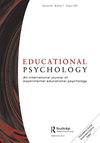为什么学龄前儿童使用移动设备父母的观点
IF 3
2区 心理学
Q1 EDUCATION & EDUCATIONAL RESEARCH
引用次数: 1
摘要
学龄前儿童使用数字设备(平板电脑、智能手机、智能手表)既有好处,也有发展风险。这种关系的调节者将是父母的角色。研究表明,在允许使用数字设备方面发挥重要作用的不是孩子的需求(如发育),而是父母的需求(例如,与休息的愿望或缺乏照顾孩子的想法有关)。所提供的数据是在2020年“网络上的幼儿”项目实施期间从729名学龄前儿童(36至72个月大)的父母中收集的。研究结果涵盖了父母允许孩子使用数字设备的原因频率。结果显示,最常见的原因是:需要履行其他职责或休息,以及缺乏照顾孩子的精力,而最不常见的原因则是:缺乏花时间在一起的想法,没有照顾孩子的想法,以及使用数字设备作为情绪或情绪的调节器。超过一半的父母以不同的频率使用了所有分析的原因。父母允许孩子使用数字设备的原因并不取决于孩子的年龄或性别。有两个例外:当父母认为数字设备是对孩子的奖励(例如,根据父母的期望执行各种任务)时,以及当他们不知道如何与孩子相处时,孩子越大,父母往往会应用这两个原则。我们的研究结果表明,有必要在当前和未来的父母群体中实施教育和预防活动。本文章由计算机程序翻译,如有差异,请以英文原文为准。
Why preschool children use mobile devices parental perspective
The use of digital devices (tablets, smartphones, smartwatches) by preschool children can be associated with benefits but also with risks to their development. The moderator of this relationship would be the role of parent. Research shows that a significant role in allowing the use of digital devices is played not by the childs needs (e.g. developmental) but by the needs of the parent (e.g. related to the desire to rest or the lack of ideas on how to take care of the child). The presented data was collected from a group of 729 parents of preschool children (from 36 to 72 months of age) in 2020 duringimplementation of Toddler on the Web project. The results cover the frequencies of reasons due to which parents allow their children to use digital devices. The results show that among the most frequently indicated reasons were: the need to perform other duties or to get a rest, as well as the lack of energy to take care of the child, while the least frequently mentioned reasons were: the lack of ideas for spending time together, lack of ideas for taking care of the child, and using a digital device as a regulator of emotions or mood. All of the reasons analysed were employed with varying frequency by more than a half of the parents. The reasons why parents allow children to use digital devices do not depend on either the age or the gender of the child. There are two exceptions: when parentsconsider digital devices as a reward for the child (e.g. for performing various tasks according to parents expectations), and when they do not know how to spend time together with their child the older the child, the more often parents tend to apply both principles. Our results indicate the need to implement educational and preventive activities in the group of current and future parents.
求助全文
通过发布文献求助,成功后即可免费获取论文全文。
去求助
来源期刊

Educational Psychology
Multiple-
CiteScore
6.40
自引率
6.20%
发文量
57
期刊介绍:
This journal provides an international forum for the discussion and rapid dissemination of research findings in psychology relevant to education. The journal places particular emphasis on the publishing of papers reporting applied research based on experimental and behavioural studies. Reviews of relevant areas of literature also appear from time to time. The aim of the journal is to be a primary source for articles dealing with the psychological aspects of education ranging from pre-school to tertiary provision and the education of children with special needs. The prompt publication of high-quality articles is the journal"s first priority. All contributions are submitted "blind" to at least two independent referees before acceptance for publication.
 求助内容:
求助内容: 应助结果提醒方式:
应助结果提醒方式:


